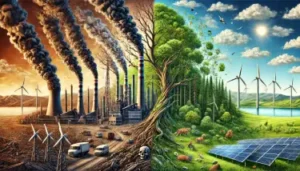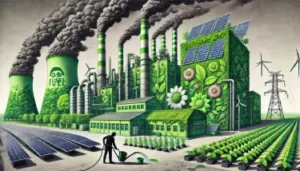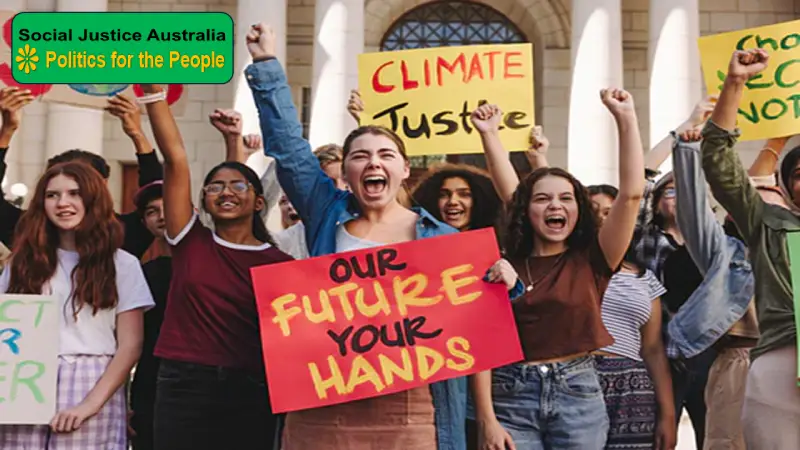Description: Climate Change
Discover how young Australians can reshape climate change policies by advocating renewable energy and tackling corporate interests. Join grassroots movements today!
Introduction
 Australia faces a critical juncture in addressing the climate crisis. Despite public calls for action, corporate interests continue to dominate climate policies, stalling the nation’s transition to renewable energy. For Gen Z and Millennials, this fight is personal—their future depends on the decisions made today.
Australia faces a critical juncture in addressing the climate crisis. Despite public calls for action, corporate interests continue to dominate climate policies, stalling the nation’s transition to renewable energy. For Gen Z and Millennials, this fight is personal—their future depends on the decisions made today.
But there’s hope. Young Australians are uniquely equipped to challenge the status quo through grassroots movements, political engagement, and personal actions.
This guide breaks down Australia’s climate change policies, the influence of corporate interests, and actionable steps young Australians can take to drive real change.
Australia’s Climate Policies and Corporate Influence
The Current State of Australia’s Climate Policies
Australia’s climate policies are often described as “too little, too late.” The government has pledged net-zero emissions by 2050, but experts warn that current policies lack the urgency and clarity needed to meet this goal. According to the Climate Action Tracker, Australia’s efforts are rated “insufficient,” falling short of the 1.5°C target agreed upon in the Paris Accord.
Meanwhile, fossil fuel subsidies persist. In 2022 alone, Australia gave over $11 billion to support coal, oil, and gas industries. These subsidies undercut renewable energy initiatives and highlight the government’s conflicting priorities in addressing climate change.
Corporate Interests at Play
Lobbying and Political Donations
Corporate influence over Australia’s climate policies is undeniable. Fossil fuel giants like Santos, Chevron, and Woodside have invested millions in lobbying efforts and political donations.
According to the Australian Conservation Foundation, over $1 million was funnelled to major political parties in 2022 by the fossil fuel industry. These financial contributions often translate into policies that prioritize corporate profits over environmental sustainability.
Greenwashing Practices
 Many corporations engage in greenwashing—presenting themselves as eco-friendly while continuing environmentally harmful practices. For example, companies that expand fossil fuel projects often claim investments in renewable energy to distract from their main activities. This deliberate misrepresentation delays meaningful climate action.
Many corporations engage in greenwashing—presenting themselves as eco-friendly while continuing environmentally harmful practices. For example, companies that expand fossil fuel projects often claim investments in renewable energy to distract from their main activities. This deliberate misrepresentation delays meaningful climate action.
Policy Influence
Industry groups like the Minerals Council of Australia actively oppose ambitious renewable energy targets. They argue that transitioning away from fossil fuels would harm the economy, using fear-based tactics to influence public opinion and government policy.
Impact on Democracy
When corporations hold such sway over policymaking, democracy suffers. Decisions are often shaped by those funding political campaigns rather than reflecting the will of the public. This undermines trust in government and delays progress on urgent climate issues.
The Environmental and Societal Impact
The consequences of weak climate policies are far-reaching, affecting Australia’s environment, economy, and communities.
Environmental Consequences
– Biodiversity Loss: Australia’s unique ecosystems are under threat. The Great Barrier Reef has experienced repeated coral bleaching events due to rising ocean temperatures. Iconic species like koala’s face habitat destruction and dwindling populations.
– Extreme Weather: Natural disasters such as the Black Summer bushfires of 2019–2020 are becoming more frequent and severe, fuelled by climate change. These events destroy homes, wildlife, and livelihoods.
Economic Strain
The financial cost of natural disasters is staggering. The 2022 floods in eastern Australia caused over $8 billion in damages, and recovery costs are expected to rise as climate impacts worsen. These economic burdens divert resources from other essential services.
Social Inequities
Marginalized communities, including Indigenous Australians, often face the harshest impacts of climate change. Water scarcity, land degradation, and displacement due to rising sea levels worsen existing inequalities, leaving vulnerable populations with fewer resources to adapt.
Health Impacts
Climate change poses growing public health challenges. Heatwaves increase cases of heatstroke and dehydration, while air pollution from bushfires worsens respiratory conditions. The psychological toll of displacement and natural disasters also contributes to a mental health crisis.
Why This Matters More Than Ever
The stakes have never been higher. For young Australians, climate change is not a distant issue—it’s a crisis unfolding in real-time. Rising sea levels, prolonged droughts, and extreme heatwaves directly threaten agriculture, housing, and public health.
Young people also face an economic divide. While earlier generations received help from industrial growth, Gen Z and Millennials inherit a world grappling with environmental and economic instability. Their activism is essential not only for fairness but for survival.
How Gen Z and Millennials Can Drive Change
Young Australians have the tools and the power to demand transformative change. Here’s how they can lead the way:
Embracing Grassroots Movements
Learning from Success Stories
Movements like School Strike 4 Climate have shown the power of collective action. These student-led protests have captured international attention, holding governments accountable for their inaction.
Tools for Activism
– Social media: Platforms like Instagram and TikTok amplify climate campaigns, spreading awareness and mobilizing support.
– Community Engagement: Partnering with local environmental groups builds networks of support for renewable initiatives.
– Petitions and Protests: These traditional forms of activism remain effective tools for creating change.
Voting for Climate Champions
Why Your Vote Matters
Young voters have the numbers to shift political priorities. Supporting candidates and parties committed to strong climate policies can change the trajectory of Australia’s future.
Post-Election Engagement
Voting is just the beginning. Engaging with elected officials, attending community forums, and holding politicians accountable ensures sustained progress on climate commitments.
Everyday Activism
Personal Actions
Individual efforts contribute to the larger fight:
– Switch to renewable energy providers.
– Boycott companies with poor environmental records.
– Reduce energy consumption and embrace sustainable lifestyles.
Leveraging Monetary Sovereignty
Australia’s sovereign currency allows the government to invest in large-scale renewable energy projects without increasing taxes. Advocating for publicly funded solar, wind, and battery infrastructure can transform Australia into a global leader in clean energy.
Building a Renewable Future
A renewable energy transition helps all Australians. It creates jobs, reduces energy costs, and protects the environment. Imagine a country where clean energy powers homes, communities thrive, and the air is free from pollution. Young Australians have the unique opportunity to turn this vision into reality.
Conclusion: Your Voice Matters
The fight against climate change is a collective responsibility, but young Australians hold the key to driving systemic change. By embracing grassroots movements, voting wisely, and advocating for renewable energy, Gen Z and Millennials can ensure a sustainable future for generations to come.
Reader Question
What steps do you think young Australians can take to amplify their impact on climate policies? Share your thoughts below!
Call to Action
If you found this article insightful, explore more about political reform and Australia’s monetary sovereignty on Social Justice in Australia: https://socialjusticeaustralia.com/.
Share this article with your community to help drive the conversation toward a more just and equal society.
Click on our “Reader Feedback” menu. Let us know how our content has inspired you. Submit your testimonial and help shape the conversation today!
Additionally, leave a comment about this article below.

